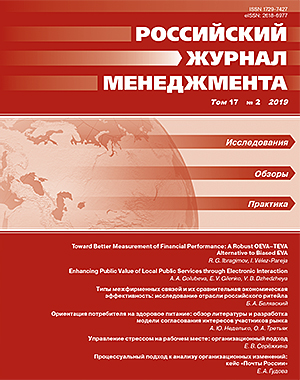Процессуальный подход к анализу организационных изменений: кейс «Почты России»
DOI:
https://doi.org/10.21638/spbu18.2019.206Аннотация
На сегодняшний день теория организации может предложить разнообразные подходы к пониманию организационных изменений. Большая часть из них рассматривает изменения как любые перемены в состоянии организации между двумя промежутками времени. Организация представляется как статичная сущность, с которой что-то происходит. В противоположность этому предлагается процессуальный подход, при котором изменения являются процессом, предваряющим существование организации и делающим его возможным. Такая трактовка изменений дает более богатое видение того, как соотносятся нововведения верхнего уровня со своей реализацией в микропрактиках сотрудников. В данной статье на материале этнографии ФГУП «Почта России» иллюстрируется эвристическая ценность процессуального подхода к анализу организационных изменений. На примере двух историй внедрения услуг показывается, насколько неодинаково по скорости и содержанию протекали одновременные изменения институционального контекста и реальной деятельности почтовых отделений. Проекты по внедрению IP-телефонии и установке пунктов коллективного доступа к Интернету показывают, что попытки выделить четкие этапы или стадии изменений скорее характеризуют организацию как не всегда функциональную и рациональную, в то время как процессуальный подход позволяет преодолеть эти теоретические ограничения.
Ключевые слова:
организационные изменения, организовывание, «Почта России», процессуальный подход, теория организации
Скачивания
Библиографические ссылки
REFERENCES IN LATIN ALPHABET
Translation of references in Russian into English
Загрузки
Опубликован
Как цитировать
Выпуск
Раздел
Лицензия
Статьи журнала «Российский журнал менеджмента» находятся в открытом доступе и распространяются в соответствии с условиями Лицензионного Договора с Санкт-Петербургским государственным университетом, который бесплатно предоставляет авторам неограниченное распространение и самостоятельное архивирование.





